 My Cart 0
My Cart 0
BROKER’S REPORT
CGS Research INITIATION on MARCO POLO MARINE (SGX: 5LY)
CGS initiates coverage on MPM with an Add call and TP of S$0.08, based on
9x 2026F P/E (in line with peers). Stronger fleet utilisation is a key catalyst.
📈Time to reap benefits from capex
MPM is in a stronger position than during the last offshore & marine
upcycle, with FY23-24 revenue and EBIT surpassing its FY13-14 peaks.
The charter of its new CSOV for offshore windfarm projects and yard
capacity expansion from Mar 25F as key revenue drivers starting FY25F.
The stock trades at 6x 2026F P/E, or a 33% discount to global peers. With a
net cash of c.S$36m (FY24), it is trading at ex-cash of 4.8x 2026F P/E.
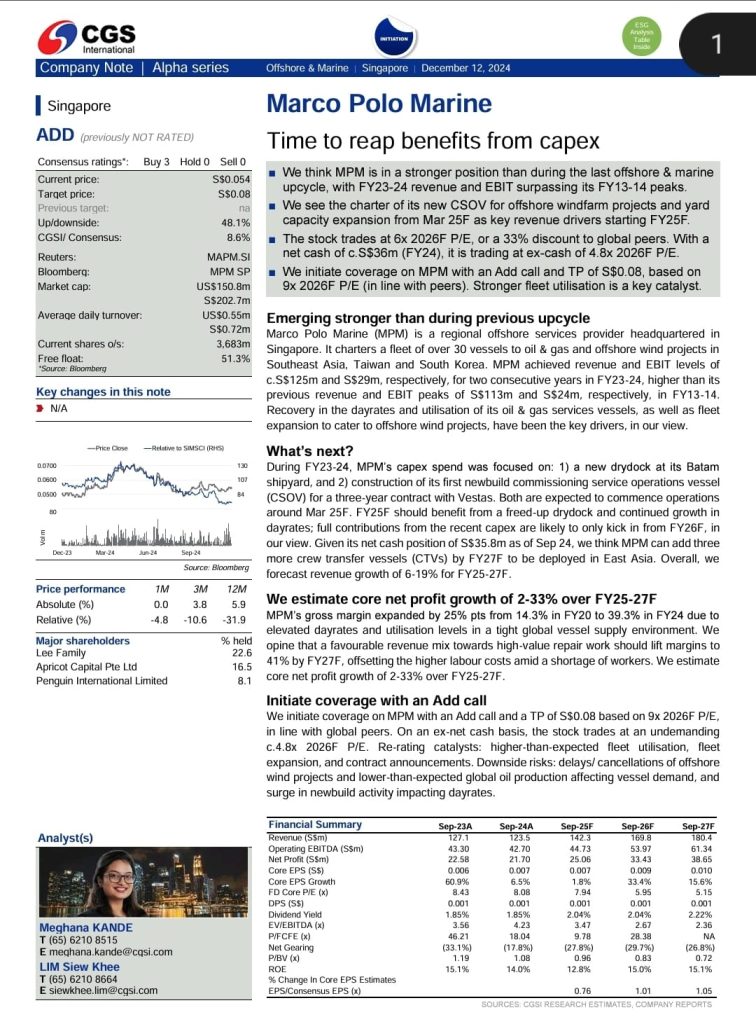
- PR healthcare agencies offer branding strategies for the companies
- From media relations to media training, every aspect is covered to educate with correct information
- Case studies, whitepapers, and press releases about the products are distributed
- Healthcare PR services also include preparation for unforeseen events, damage control, and prevention
- Services include SEO, social media branding, and online reputation management.
- What all happened?
- Who did it?
- When and Where did the incident take place?
- Why did it happen?
- Press Communication
- General Strategic Communication
- Internal Communication
- Crisis Management
- Non-Profit Public Relations
- Community Management
- Public Affairs
- Reputation Management
- Media Relations
- Crisis Management
- Press Releases
- Speech Writing
- Social Media
- Event Planning
- Market Research
- Outreach
- Internal Copywriting, and
- Media Training
- An internal team
- A PR firm
- Combination of both
- Align your goals with your budget
- Don’t forget your priorities ( SMART goals)
- Include hidden costs
- Company’s Job Page – To get an idea about their current objectives and tactics. For instance, if they are building a social media team.
- Strategic Announcements – To learn about their success, initiatives, new strategies, and their reputation. The idea is to know how well they handle their own public relations.
- Shareholder Letter – To get an idea about their unique value proposition, financial strength, and accomplishments.
- Glassdoor – for reviews and feedback from their employees.
- What are your specializations? Do you hold expertise in a specific industry?
- How will get our business media coverage?
- What are your metrics for measuring success?
- What are your plans to work with our marketing team?
- What’s your pricing structure?
- What are your strategies for the first few weeks & what should we expect?
- Can we contact your past clients?
- What’s your work process like? Who would we be working with?
- Public Relations
- Investor Relations
- Media Relations
- Corporate and Financial Communications
- Crisis Management
- Market research and branding
- Content creation
Unlock the Power of Global Investor Relations! 🌐💼
At Gem Comm, we bridge the communication gap for companies with a global footprint, like our client Procurri – listed on SGX since 2016 and with a CEO based in the US. 🇸🇬🇺🇸
𝗣𝗿𝗼𝗰𝘂𝗿𝗿𝗶’𝘀 𝗠𝗿 𝗝𝗼𝗿𝗱𝗮𝗻 underscores the importance of tapping Gem Comm’s familiarity with the nuances of SGX and the local investor community. This strategic partnership allows Procurri to better articulate its messaging and vision with clarity, transcending geographical boundaries even while Mr Jordan leads from the US.
Gem Comm’s expertise lies in seamlessly connecting businesses with their investors, no matter where they are. We help listed clients like Procurri uphold the highest reporting and disclosure standards while fostering close communication channels on the ground.
By leveraging on our tailored investor relations strategies, we cultivate trust, nurture enduring connections, and unlock lasting value for companies and their stakeholders alike.
Trust Gem Comm to be your global investor relations partner – we can elevate your business to new heights while keeping your investors engaged and informed every step of the way! 🚀🌍
𝗠𝗿. 𝗦𝗲𝗮𝗻 𝗟𝗲𝗲, CEO of 𝗠𝗮𝗿𝗰𝗼 𝗣𝗼𝗹𝗼 𝗠𝗮𝗿𝗶𝗻𝗲, one of our esteemed clients, emphasises the significance of effective investor relations in keeping shareholders well-informed about the company’s performance, strategy, and future prospects, fostering understanding and trust. By gathering feedback from shareholders, the company enhances transparency and communication, fortifying its relationship with shareholders.
𝗠𝗿. 𝗟𝗶𝗺 𝗔𝗵 𝗖𝗵𝗲𝗻𝗴, CEO of 𝗗𝘆𝗻𝗮-𝗠𝗮𝗰 𝗛𝗼𝗹𝗱𝗶𝗻𝗴𝘀 𝗟𝘁𝗱 (SGX: NO4), one of our esteemed clients emphasises the significance of sharing company developments with shareholders, irrespective of whether the news is positive or negative. This practice ensures shareholders are well-informed about the company’s endeavours, which cultivates investor trust and engagement.
When we talk about the top healthcare PR agencies, we consider spreading awareness about a brand or business. Furthermore, these agencies help your brand to get the best attention. Meanwhile, they also add backlinks or references to your brand website or portal. It is more than advertising and media; these agencies are here to promote the brand. Your business or brand gets the needed attention via websites, magazines, TV programs, newspaper publications, and more.
What does the healthcare public relations agency do?
The first and foremost function of the public relations healthcare agency is to provide education and information. Such information can relate to upcoming diseases, monitoring of medical conditions, healthcare laws, products, and much more. Furthermore, such information should be clear and correct as it will directly affect the patients. Secondly, information should not contain difficult words that are not understandable to the common people. It can be fatal for the patients if the information is not shared correctly.
As we talked about what the healthcare PR agencies do, we took note of their services.
Top 10 healthcare PR agencies in 2022:
In this section, we take a look at the top 10 healthcare public relations agencies in 2022. They have been offering the best services and are famous for what they aim for.
Gem Comm:

If you want to build your brand reputation, Gem Comm is the one name that is one of the top healthcare PR agencies. This agency offers services that include strategy development, brand management, media relations, crisis management, internal communications, and thought leadership. Gem Comm’s in-depth industry knowledge is top-notch, which has given it the best, most trusted, and most renowned PR agency in Singapore.
The agency knows what the client requirements are, and based on that, it provides innovative strategies, campaigns, creative networking with a positive influence.
Edelman:
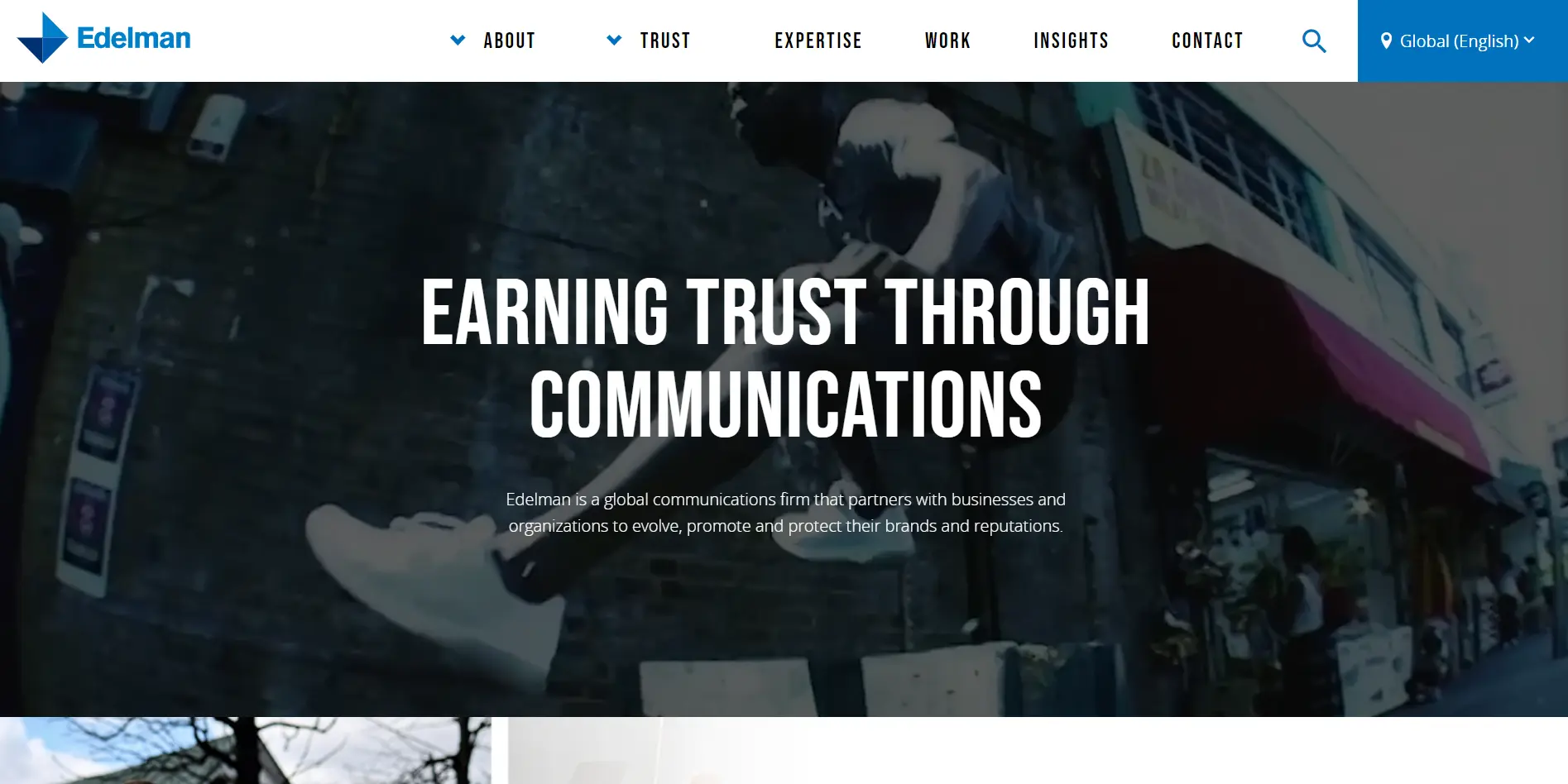
One of the largest and top healthcare PR firms focusing on digital practice and marketing services. Richard Edelman’s agency has also won the best Digital PR consultancy award and a Global PR Agency of the year 2019. The agency has earned trust in the market by engaging the audience at the right time. It offers in-depth counseling for different markets and cultures. The agency has remained successful in its KFC campaigns focusing on charity efforts, with a donation to the KFC youth foundation.
Ruder Finn:
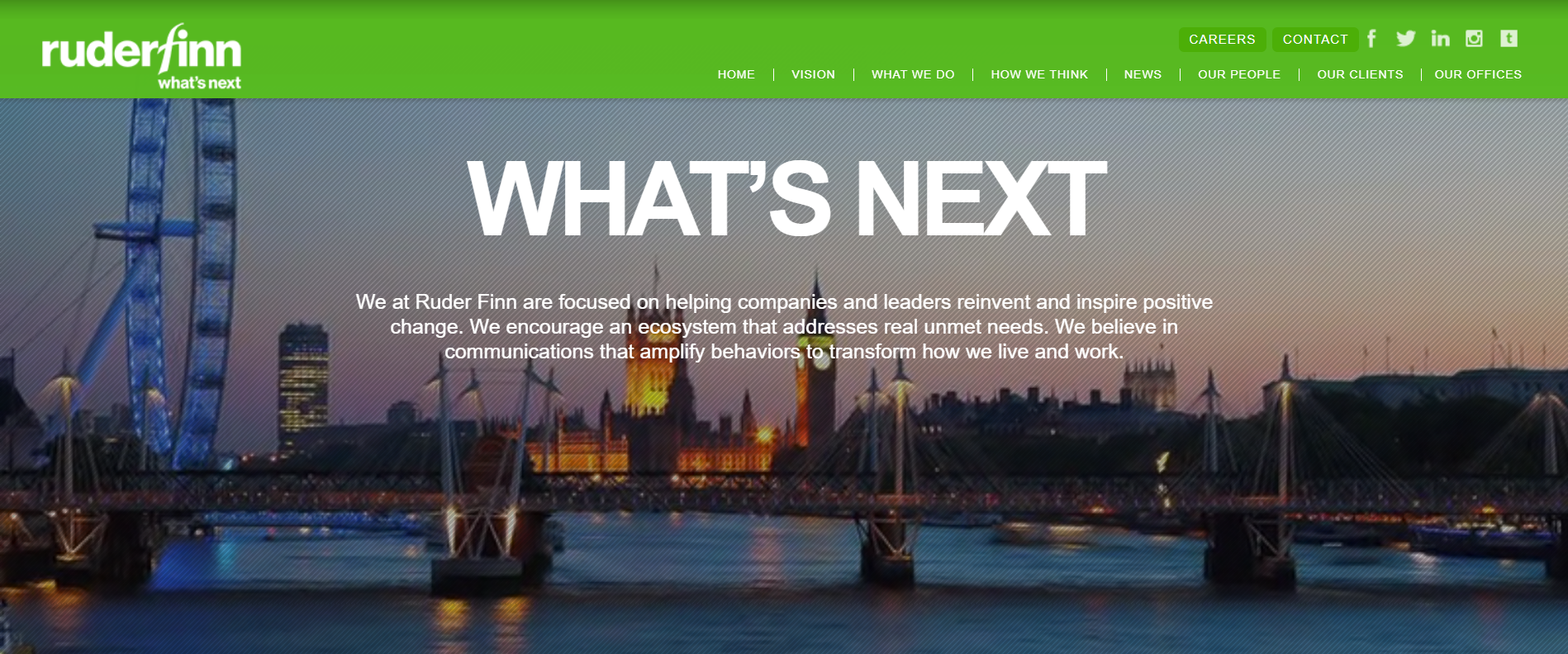
It is a creative agency with independent global communications. The agency has helped different brands by redefining their leadership strategies, communication strategies, rethinking marketplace and customer experience, etc. Furthermore, the agency’s data-driven approach and expertise revolve around health & wellness, technology, customer connections, and innovation. During the COVID-19 pandemic, Ruder Finn provided AI-driven solutions, analytics, and digital storytelling for audiences.
Zeno Group:

A healthcare communications agency with an independent and global focus. You can see the brightest talent in Zeno Group pushing boundaries for strategic communications worldwide. This agency is committed to achieving real business values for the brands.
ICR:
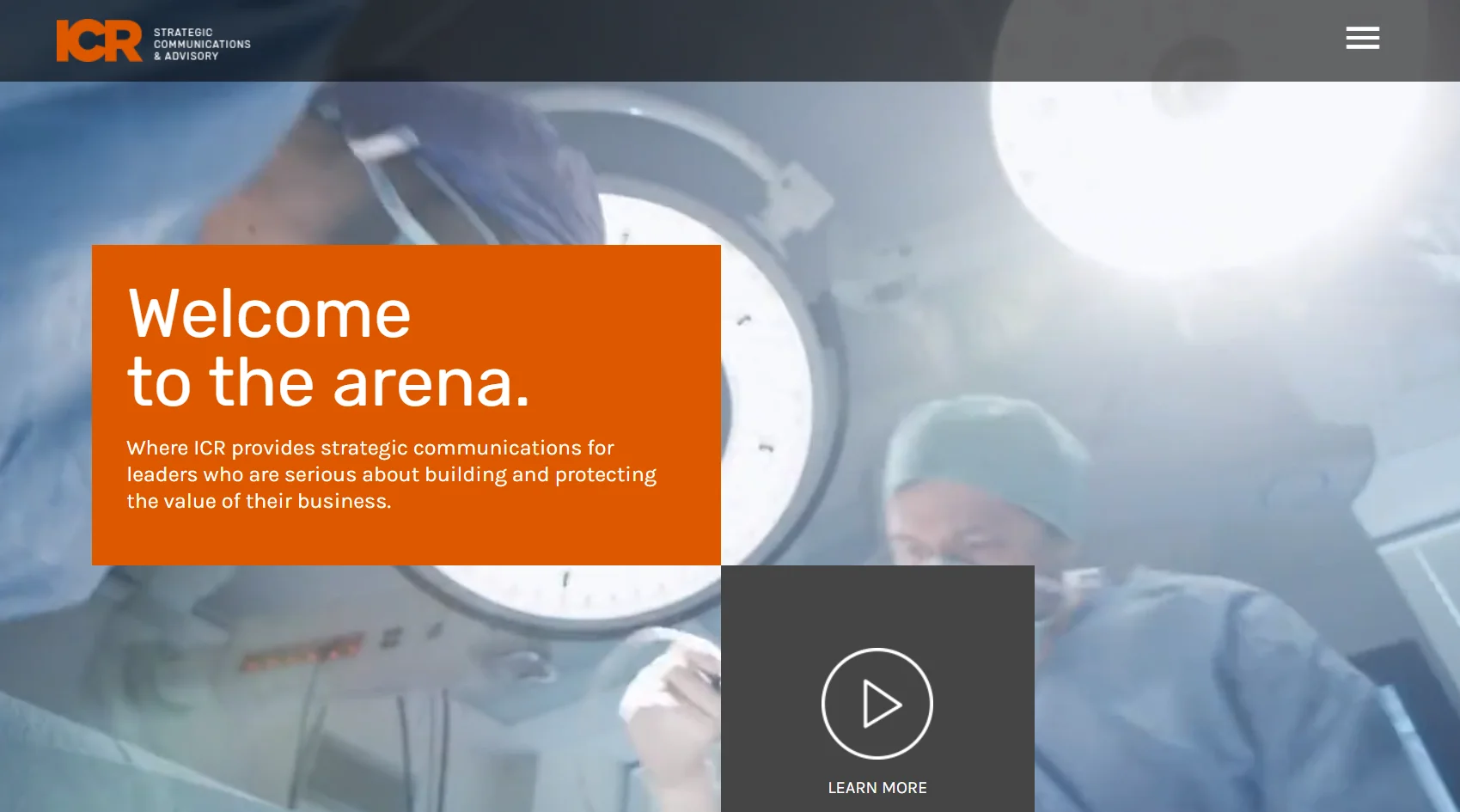
From building awareness and credibility to achieving business goals, the ICR agency has remained committed to executing its strategies. The healthcare public relations firm’s service model brings knowledge to the deep sectors. It links with the senior professionals for communications and veterans from capital markets. ICR is one of North America’s best and top-rated independent communications agencies.
WebiMax:

One of the best healthcare PR agencies with a global presence, with their headquarters in Philadelphia, USA. It focuses on providing digital marketing services such as search engine optimization (SEO), social media marketing, lead generation, online reputation management (ORM), consultation services, and much more.
Communications Strategy Group (CSG):
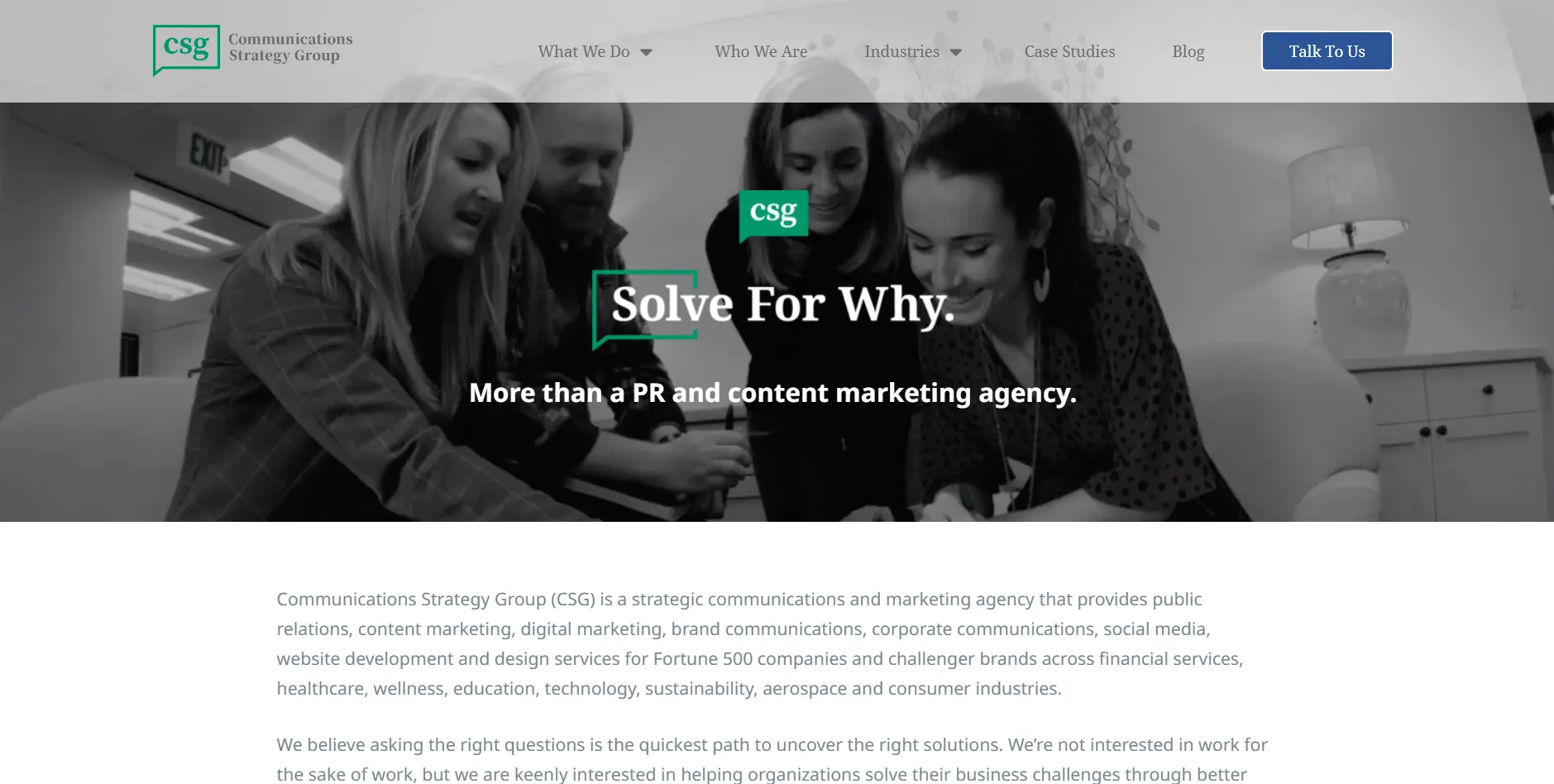
CSG is a Colorado based healthcare public relations agency. It provides content marketing services, branding strategies with corporate communication, web design services, social media marketing, and more. Furthermore, the CSG agency considers health & wellness, professional services, information about financial challenges, and much more. With the help of public relations strategy, CSG agency ensures to find the target audience, connecting potential customers with the brands.
JPA Health Communications:

When it comes to JPA health agency, it is a bouquet of integrated services such as public health, pharmaceutical, biotechnology, engagement with stakeholders, social media, media relations, branding & digital communications, meetings, and planning, and much more. JPA works closely with the health sector to assist people in leading a healthier life.
Evoke:

One of the top healthcare PR firms offering media and communications platforms focusing on health & wellness. This agency is people-centric and assists with healthcare complexities. Evoke’s primary mission is to engage human connection with the brands and customers. Furthermore, Evoke provides various services, including branding, campaign management, marketing technology, media, aviation, and more.
Real Chemistry:
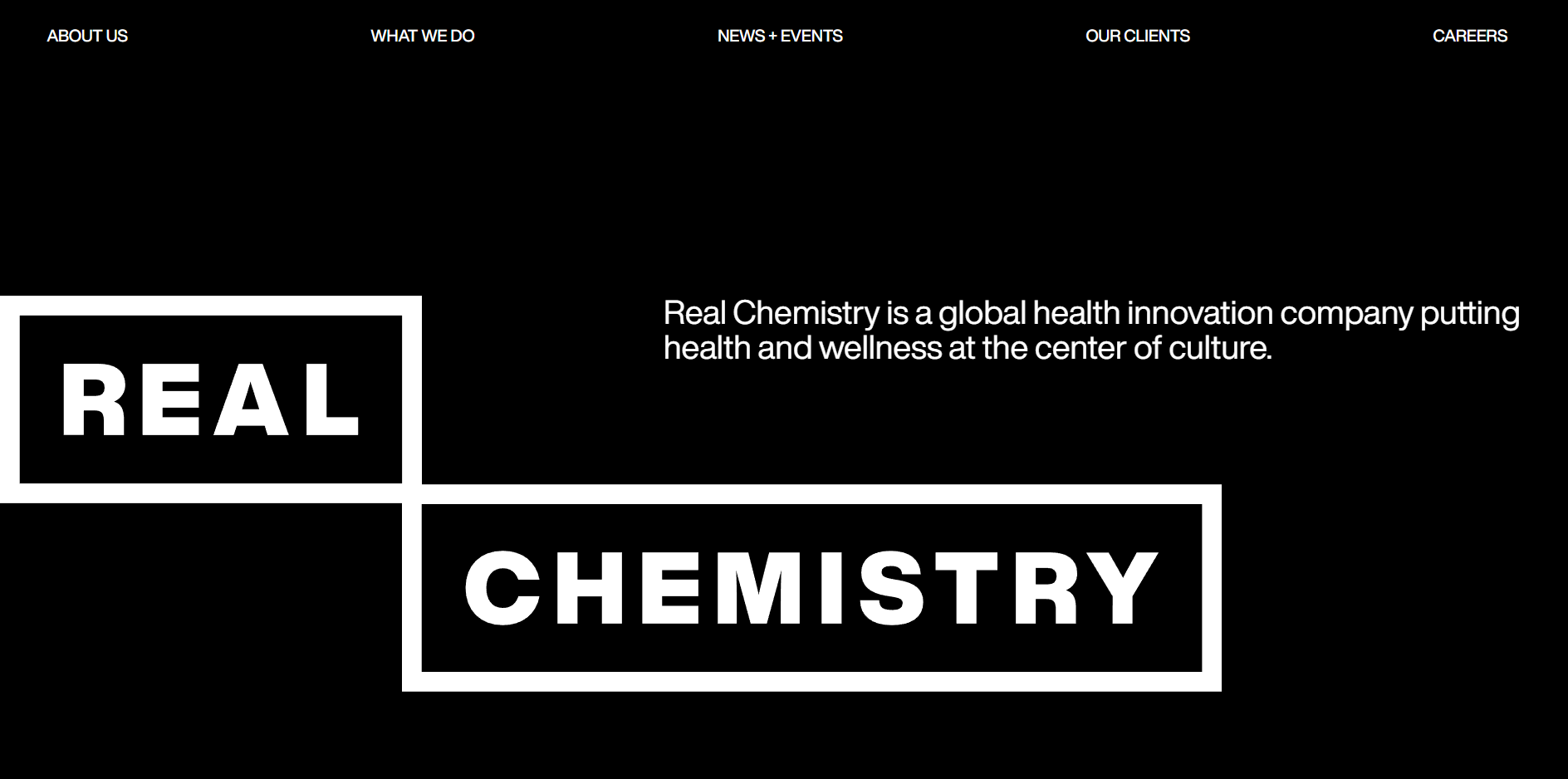
It aims at making the world a better and healthier place by providing innovative ideas. Furthermore, Real Chemistry considers the challenges of modern healthcare and how the world has faced them. This agency has offices all over Europe and the United States of America. The agency’s health experts provide corporate solutions focusing on the patients. In addition, they build chemistry among the patients with the best healthcare experts.
We hope the list of these agencies will help you in your upcoming business campaigns. Explore these options and see which of these agencies best fit your needs.
What are the first five questions that come to your mind when you hear or read any news?
Surprisingly, these are the guiding principles of storytelling, marketing, and journalism. Any story that fails to answer these questions tends to be incomplete. Answering these 5 W’s of public relations is necessary to make your PR campaign successful.
Let’s get into understanding these 5 Ws of PR in detail. But before that, let’s recapitulate what actually public relations is.
What is PR?
It is the practice of managing the information spread between an organization or individual and the public. It is a strategic communication from a company to the public to cultivate or maintain a brand image.
Check out our complete guide on public relations and its types.
5 W’s Of Public Relations:
If, as a business or an organization, you are trying to create a successful PR campaign, they need to ask these important 5 W’s.

1. What:
Before you start creating any PR campaign, the first thing you should ask is, What is the PR campaign about? Be crystal clear about the purpose of your PR campaign, and only then will you be able to strategize and plan it well.
List down all the goals you want to achieve through the PR campaign. For instance, if you are about to launch a product, determine what it will do to make the customers’ lives easier. Your intent will determine the series of actions that you should perform to achieve your set goals.
Remember, the answer to this question should be something that your audience is interested in.
2. Who:
The second most important question is, “who is the campaign really for? Who do you intend to send this announcement to? Answering the question will help you refine the content of your campaign. Also, you will be able to decide the tone of the campaign depending on “who” the campaign is targeting.
3. Where:
Once you are clear about the ‘what’ of your campaign, the next you should ask is, WHERE do you want to draw the eyeballs? Will you send it to the journalists or advertise it through your company’s social media?
With the world transforming quickly, businesses today have more platforms than ever before, which include the company website, Facebook, LinkedIn, Twitter, SoundCloud, and YouTube. So, when you answer the question, “Where,” it will clarify which one of these platforms you will use to cut through the noise and reach your audience.
4. When:
As it is always said, Timing is everything! This stands true for any PR campaign as well. According to an informal poll conducted on 215 PR professionals discovered that Tuesday is the best day send releases. Further, a study by MarketWire found that Friday is the best day to pitch the press as the journalists are overburdened with the news.
Well, this may vary from business to business and time to time. All you need to do is research the market and industry and decide on major press releases and launches accordingly.
5. Why:
It simply explains why anybody should care about the campaign. Often this factor is overlooked when preparing for a PR campaign.
Finding the answer to this question will help you add value to your campaign. Because if there’s no way a business, product, or service is significant for the target audience, then there’s no need to have the campaign created.
Think like your audience and put yourself in their shoes to get an answer to the “WHY.” Include powerful words to emphasize why this campaign is significant for the audience. And if you still can’t find a significant reason to launch your campaign, there’s no point moving further.
The Final Say:
When you successfully answer the 5Ws of public relations, it results in clear communications with your audience in the most effective way. You can cater to the right audience in the right way and with the right message. You would not want your audience to be dazed and confused as they see your campaign. So, the next time you plan a PR campaign, start finding the answers to these 5W’s of PR before finalizing it.
If you are trying to make a long-lasting impression in the market, consider PR a crucial part of your marketing strategy. Any business, regardless of its size, can benefit from positive publicity and media coverage. PR is a proven way to take your brand message into the ‘news’ space rather than advertising.
In the current scenario, where the market is competitive for every product or service, PR is a powerful branding tool that helps your business to differentiate and stand out from the crowd. Plus, you can build an emotional connection with the audience and establish a brand persona.
And for you to achieve all these benefits, you must hire a reliable PR agency. Unfortunately, this is where most businesses fail. Since PR covers numerous functions, it becomes complex to understand what PR agencies do.
This article will address all such questions that will help you get to the core of PR agencies. By the end of this article, you will have the confidence to hire a PR agency that is right for your business.
Let’s get started.
What is Public Relations Agency?
In simple words, a public relations or PR agency specializes in managing the public image of their clients (for example, businesses & organizations) and engaging with their audience. These are the experts who promote a brand via editorial coverage. Unlike advertising, PR agencies are involved in “earned” or “free media” through stories appearing in newspapers, TV, and magazines. Such agencies help their clients acquire new audiences and achieve business goals.
Types Of Public Relations Agency:
What does a PR Agency do?

Often businesses get confused between advertising and PR. Well, it’s true that the duties of advertising and PR agencies can look alike, but their functions greatly differ. While a PR agency is aimed at boosting the brand reputation of a brand, a marketing agency is responsible for driving sales. Besides maintaining a positive brand reputation, they also help in crisis management – recovering a bad reputation and making it resistant to negativity.
A PR agency can offer the following services:
How to Hire a PR Firm/Agency?
So, now you know why you need to hire a PR agency. However, choosing the right PR company is important. Here are some tips that will make hiring the right PR agency process a lot easier.
1) Decide On Your Goals:
The foremost thing is to know your own goals – you need to be clear enough about what you are trying to achieve by hiring a PR agency. Asking questions like, why do I need to hire a PR agency can get you the goals.
To begin with, you can set SMART goals – specific, measurable, attainable, relevant, and time-bound. When you learn about your goals, it is easier to decide on what type of PR agency would be ideal for your business. For instance, if you run a non-profit organization, you can go for hiring a non-profit PR agency.
2) Explore Your Options:
Typically, you can choose from three options when it comes to hiring a PR agency:
Each of these types has a different price tag and will demand different levels of involvement from your organization. Based on your preferences, such as budget and goals, you can choose to either hire an in-house team or outsource it to an external firm. However, the best option is to have a mix of in-house and external PR experts.
The in-house internal PR person will have a good knowledge of your overall business and its marketing strategy. As such, they can work with the external PR team and build a comprehensive PR strategy for your business. Also, having an internal PR person can handle all the communication with the external team without your intervention, allowing you to focus on other important business chores.
3) Set Your Budget:
Hiring a PR agency can burn a hole in your pocket. Hence, it is important that you set a budget and convey it to your prospective PR firms. Before you begin your hunt for a PR agency, consider how much you’re ready to spend on your PR efforts. Try to answer questions like, “To what extent can we contribute to PR monetarily? “Will this budget come out of our marketing budget?”
Further, when creating your PR budget,
4) Do Your Research:
When you’ve your goals and budget set, the next, you should start researching the right kind of PR agency for your business. Collect as much information about them, including their team, track record, specializations, social media presence, cost, reviews, testimonials, top clients, etc.
If you are wondering where to collect all this information from, here’s where you should at:
Remember, knowing all this will ensure you are hiring the right PR agency to work with.
5) Prepare Your Questionnaire:
Even if you have gathered information about their current and past work and reputation from different sources, it’s crucial to get in touch with them in person. When you meet them, ask them questions to learn about their experience, price, prior successes, reviews, and testimonials. Create a list of questions like:
Make sure to ask these questions to every PR agency on your list. Their answers will help you decide on the ideal PR firm for your business.
6) Set Expectations:
When you’ve finally decided which PR company to hire, ensure you’ve discussed your objectives and goals clearly. Also, set up a clear line of communication while defining your expectations. Convey your SMART goals to your PR firm, and determine you will you measure success.
7) Complete the Onboarding:
Lastly, go through the onboarding process with your PR agency. Get to know who is the go-to person and communicate your goals. Create your daily, weekly and monthly plan with them and know how they will proceed. Plus, ask them questions like, “How often will we connect? “How will we track the outcomes of our work as a team?”
The Bottom Line:
So, investing in public relations can be a great aid to your business reputation. And hiring a PR firm is a great way to boost your existing marketing efforts, increase traffic and sales, and build brand awareness. We hope these seven tips will guide you through the journey and help you achieve the desired results in the long run.
Does the two terms public relations and advertising the same? Or do they have different meanings associated with them? Well, many confuse them as similar, but in reality, these are two different words with different perspectives. This difference can only be acknowledged when they are deeply understood and appreciated.
For a company, it is important to manage both efficiently for unhindered growth and success. Let’s break the ice and check out the difference between public relations and advertising!
What is PR (Public Relations)?
Public relations is the act of professionally promoting and managing the positive image of a brand. It is influencing how others see and feel about a brand, company or person. It is a communication strategy that aims to benefit organizations by doing their publicity.
PR takes care of everything how the information related to the company or the individual is conveyed to the public and especially the media. This is maintaining the image of the company for countless benefits associated with promoting your product or services, sustaining the position and announcing their accomplishments.
Here are a few things that you must know about PR
1. About PR firms:
It is a persuasion business where professionals create narratives to fulfill their goals. You may hire a PR firm to improve, protect or build your reputation. They also mitigate the damage when anything or anyone tries to defame you through strategic responses to the media.
The role of a Public relations agency is to create positive publicity for its clients and improve its reputation in the industry. They may be engaged in press releases, expand professional networks, manage social media, write blogs, and deal with the media.
2. Aspects of PR:
There are various ways to maintain a reputation or interact with the audience. Though there is a growing perception that social media can replace traditional media but this ain’t true. Notice that most companies press release or publicize in various ways and then post it on social media. Social media platforms augment your PR efforts and amplify the results.
PR includes various disciplines like corporate communications, crisis communications, marketing communications, content creation, brand journalism, reputation management, events, and many more.
3. Measuring PR:
PR cannot be measured accurately but can only be estimated and compared. Though there are various models and methods available to count upon it they all just give a rough idea and are nowhere exact.
What is Advertising?
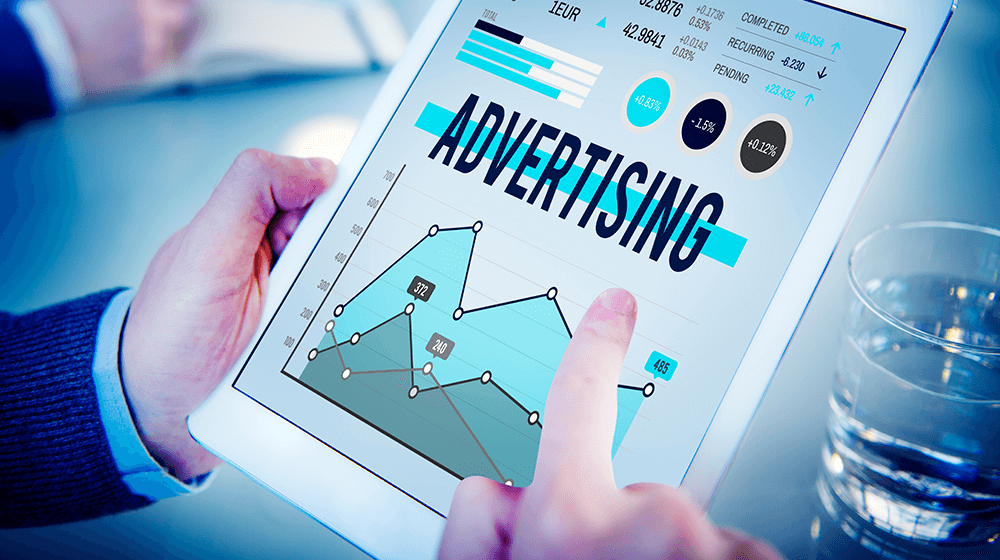
Advertising is a marketing communication that is intended towards selling a product or a service to the targeted audience. It is the oldest form of marketing that aims to sell specific products or services through their promotion and by reaching out to the potential audience. With the introspection of the internet, advertising is now categorized into two – traditional and digital advertising.
Traditional advertising is all about promoting the products on regular sources like Television, mail, radio, newspapers etc. Although it is an old form of marketing your products but is still effective and reaches out to a larger audience.
Digital advertising on the other hand is the new version of marketing. It is more efficient and reaches the target audience in less duration. Digital advertising tools include pay-per-click, social media platforms, display advertising and more.
Key Differences Between PR and Advertising:
There’s a famous quote that effortlessly differentiates these two. It says “Publicity is what you get while advertising is what you buy”. One is paid media while Public relations is media earned. Pr vs. advertising is like purchased vs. earned, Paid vs. unpaid, doubtful vs. credible and so on. Let’s find out more about such differences!
1. Consumers’ Perspective:
Advertising: The audience watching the ad knows that it is inclined towards them for buying the product or the service. The concentration directly goes onto the services, their qualities and the price. The features of the product are investigated and examined for benefits.
PR: During Public relations, consumers are not much aware of the brand’s intentions. Here the attention is not on what you sell and how it is but on who you are and what you do. It is learning about something you didn’t pay for. The third-party endorsement makes it more valuable and in the long run benefits you more than advertisements. Advertisements may increase your sales of a particular product but PR has the power to improve the sales of all your products and services in one go.
2. Credibility:
Advertising: Advertising and public relations both are credible but the amount varies. The audience may not entirely believe what is being told in an ad. It is dictated by the owners and may not hold the complete truth and thus is less credible than the PR.
PR: Public relations have high credibility as news comes from trusted third-party media. Also as the brand reputation is high and maintained, people tend to believe what is being said to them and even convey it to others. PR gives birth to mouth-to-mouth advertisement which is far better than any other advertising technique.
3. Target:
Advertising: In an advertisement, your target is your potential audience. Here through some action words, you are targeting your clients and motivating them to take the specific action as desired by you. Your goal here is to sell your product or services to them and thus you are trying to impress them. Also in an advertisement, you praise your product so that people are influenced to buy it.
PR: In the case of PR, you praise yourself and try to influence the media and audience to like you. Here the immediate goal is to just enhance your brand’s reputation and the ultimate goal is to improve your credibility to sell your products easily.
4. Creativity:
Advertising: Advertising gives you room for creativity. Here you could show your talent to excite your audience to buy your products. The new campaigns and materials can make you stand apart from the crowd and improve your visibility.
PR: it is just about creating buzz about your company to be known. It is like branding. Here creativity is just about finding new media platforms and intriguing there.
5. Control:
Advertising: When creating an advertisement, you have complete control over how it will look, feel and turn out to be. You can also decide where it appears, how frequently it will appear and when it is displayed. The amount of money spent on the ad will also dictate the reach.
PR: In Pr, you have less control over the results. The media and media channels portray your image and are the only ones to decide you are presented to the audience.
6. Communication:
Advertising: It is a monologue communication process. In advertising, you draw public attention to sell your products and services through paid tools and activities.
PR: Public Relations is a two-way process of communication. Here the brands listen to the customers and the public and also respond to them. It is a strategic communication technique that aims at forming a beneficial relationship between the brand and the audience.
7. Price:
Advertising: It is paid! Even the outcome or the results depends on the money you spend on it. The brand has to specifically pay for the advertisement and decide when it will be aired to the public.
PR: Public relations focus on free coverage of the brand. It ties and aims for free publicity through media and press releases.
Conclusion:
This blog diligently answers the question of “how pr is different from advertising”. As far as differences are concerned they are pretty much simple and easy to understand. Now, one can handily use these two strategies to improve their business.
Take note that PR foreshadows marketing and is essential to your success!
Public relations or PR is a vast and complex discipline with a value of about $15 billion. As the key link between you and everybody else in your business, it has to be maintained at all times with utmost priority and diligence.
There are many types of public relations that you’ll need to manage on a daily basis if you want to build a solid reputation in the market and keep it intact. And which has now become all the more important given the rise in collective learning and awareness in this age of information.
Apparently, the more people learn, the more they want to know. Having said that, information can have a large impact on people or masses as we see all around us. And this begs the question as to what concrete steps you should take to control or minimize its effects so as to get the most out of today’s well-informed market.
Before we get into that, let’s quickly take a tour of what public relations really are.
What are Public Relations?
According to the dictionary, public relations simply refers to “a professional maintenance of your public image, one which is in your favor.’’
In laymen’s terms, it’s all about knowing what people want and how to deal with your consumers and everybody else connected to your business or line of work for a healthy and mutually beneficial relationship.
Be it your partners, advisors, investors, consumers, employees, government officials, competitors, or whomsoever concerned with your business, the goal of public relations is but one- to protect your company’s image and overall brand reputation at large and at once.
Moving on, depending upon the different groups of people you’re dealing with and their specific interests, the functions of your PR department may also vary. To grasp that better, let’s turn our attention to different types of PR that you need to focus on.
Types of Public Relations:
1. Media relations:

As the name suggests, it is all about getting the right approach in the press and the media so as to get your message across in a favorable and approvable manner.
The only catch is that media in the modern day is not what it used to be.
All hail digitalization, it’s gotten even more channels of mass communication than ever before. From pen and paper to all kinds of instant and digital media, enough to keep journalists on the edge of their seats, day in and day out throughout their shifts.
And this is why it’s crucial to not skip/miss out on any of the communication channels if you truly want the press coverage you seek and the impression you need.
2. Community/ Govt relations, or CSR:
While media gives you the means to communicate with the masses, a community is where the masses live. By contributing to the betterment of the society and the environment you live in as a whole, you can strengthen your community relations as well.
Better known as Corporate Social Responsibility (CSR), it’s where you realize and commit yourself to nurture the world around us. Be it through charity, fund-raising, social affairs, or any other welfare-oriented activities.
The point is- to keep your goals aligned with the local community and stay away from government scrutiny, false claims, and bad rumors.
3. Investor relations:
Just like authorities keep an eye on your business practices, shareholders do too, especially in your financial affairs, primarily because they have invested in you, and secondly, they don’t want to take a hit if things go south.
This is where proper communication with your business partners and investors comes into the picture. Something you can easily accomplish by sharing your financial report with them on a time-to-time basis.
Being transparent with your financiers will also help you gain trust and build strong connections within the financial community, which plays an immense role in times of a financial crisis.
4. Crisis communications:

Speaking of a crisis, another critical area of public relations is to deal with any kind of disasters, mishaps, or controversies that can occur during a business operation and perform necessary damage control.
This includes disclosing the nature of the crisis or the information to the concerned individuals, its impact, and a possible plan of its control.
Again, communicating the true gravity of the situation to the affected people and those who are involved in managing it is extremely important.
5. Public Affairs:
Sometimes referred to as lobbying, it is how you shape the opinion of government, politicians, decision-makers, think tanks, and other key associations so as to influence local laws and policies in your favor.
Not by bribing per se, but by using legit proofs and data that aligns the public with your company’s goals and vision.
There are many ways to achieve that, be it in person, during meetings, public briefings, or press conferences, or by offering your support to the government for upcoming projects and undertakings.
6. Online communications and Social Media:
Social media platforms like Facebook, Twitter, LinkedIn, Instagram, TikTok, and Youtube are some of the easiest and the fastest ways of reaching your audience, with 9 out every 10 PR agencies making their way online.
Apart from giving your consumers a round the clock support, it also boosts your online presence at zero cost.
But that’s not all, the more active you are online, the more opportunities you’ll have of showing that you care. A perfect way of strengthening your relationship with online viewers.
Plus, if you want to target a rather larger audience, you’ll always have the option of having online influencers vouch for your word.
Managing your online reviews is also an effective way of preserving your reputation.
7. Internal/ Employee communications:
One of the areas of public relations that are often overlooked, especially by small-scale businesses, is the level of interaction between the management and the workforce.
FYI, your employees are the biggest promoters of your brand on a day-to-day basis, and it’s only just to give them the respect they deserve.
Although most companies have dedicated teams to take care of human resources, a daily briefing and regular communication will do the job just fine.
Introducing special programs and personal growth of your employees is a great way to keep them motivated in order to get the productivity you seek.
8. Strategic communications:
Strategic comms is all about releasing the information in a planned manner so as to meet your business objectives rather than distributing it here and there.
After all, it is what sits at the crossroad between marketing and public relations.
No wonder why it’s the No. 1 skill in the entire PR market.
Conclusion:
As evidently clear, PR has many different types but all aimed at one thing i.e., to get you the right publicity in all your business endeavors.
As powerful of a technique as it is, in no way is it something that you should bring out only at the time of emergencies and press releases. But something that has to be practiced at all times when running a business.
When planning to go with a PR firm, there are certain things you need to keep in mind. For example, the company should have a great reputation, be budget-friendly, and must belong to your business niche with a right amount of experience, and expertise.
At the same time, it should have a sound relationship with the press and online media, and be well-versed with latest tools and technologies to instantly convey your word out globally.
Although most companies with these qualities would make an effective PR team at any given day, some have gone even further to leave an impeccable mark on the PR sector.
Be it their creative approach, superior skills, or the zeal to succeed, the fact is, company like these have made a large impact in making public relations a $100 billion industry that it is today.
Without further ado, let’s see what they are:
1. Gem Comm:

Hailing from Singapore, and serving in Asia, America, and the Pacific region, Gem Comm is a communication consulting firm that offers high-end solutions to businesses of all kinds.
What makes Gem Comm quite unique is their practical approach and intricate knowledge of the field which is of utmost importance if you want to make a powerful impact on the market.
With an expert team of individuals from all around the globe, Gem Comm makes it easy to come up with innovative PR strategies to get you the publicity you need.
Some of their most admired areas include:
As you can see, Gem Comm covers almost everything there is to give you a positive brand image and long-lasting relationships with the public and the media.
2. Edelman:

Talking about the best PR agencies in the world and not naming Edelman, would be a crime.
Founded by Dan Edelman back in 1952, it’s the largest global communications firm with several accolades and honors to its name.
Based primarily in Chicago, IL with their secondary headquarters in New York, Edelman is well on its way to becoming the first $1 billion PR firm, and for all the good reasons.
In the last 70 years, Edelman has been able to bag some of the biggest projects from some of the biggest clients like Starbucks, Microsoft, Samsung, and Asics.
With over 60 offices worldwide, Edelman is well-known in all major sectors due to their extensive knowledge of fields ranging from branding and marketing to public relations and communications, research and analysis to business development and social governance.
3. Berkeley PR Communications:
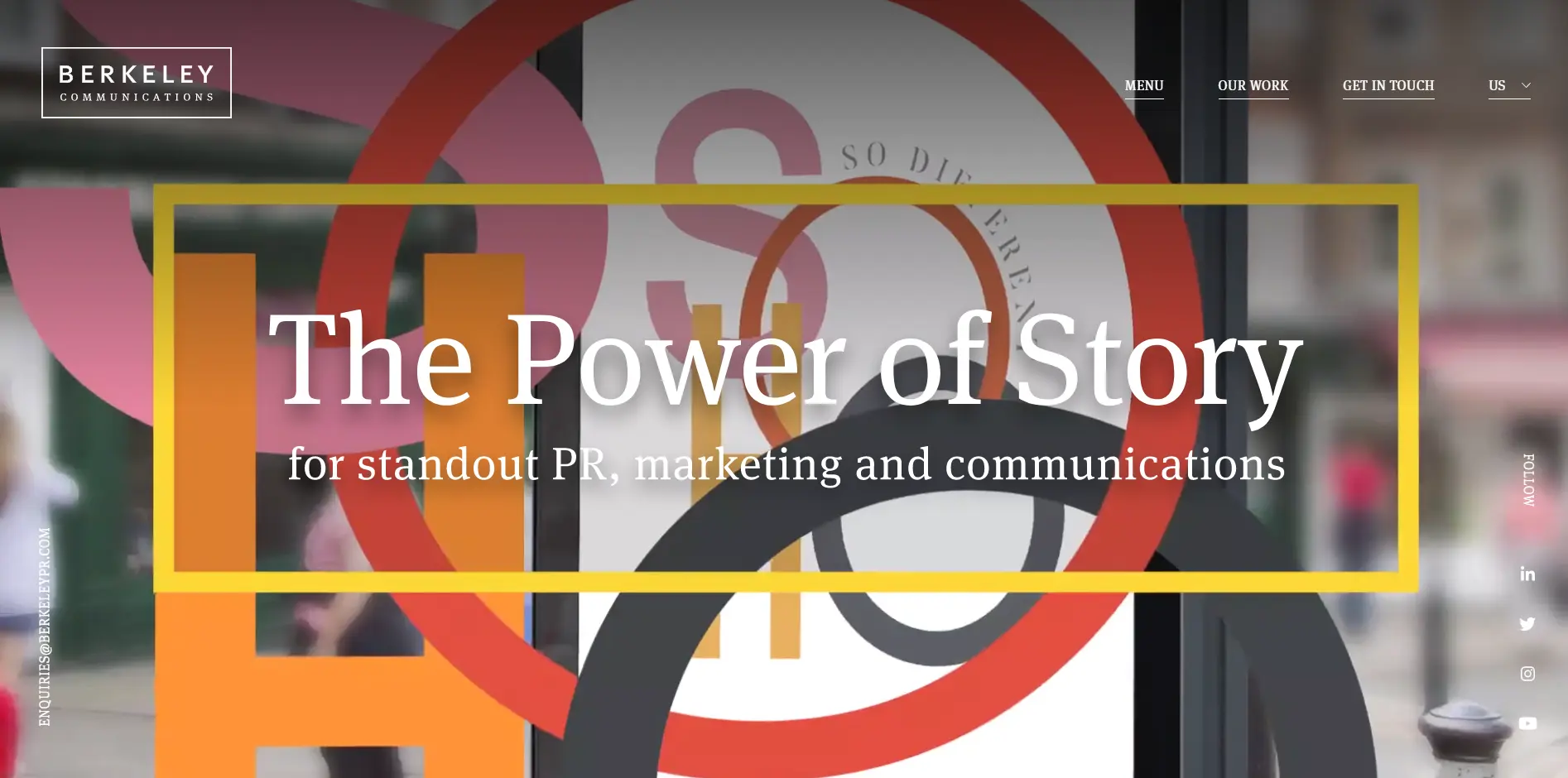
Another one of a kind PR agency that you could think of is Berkley Communications. Known for its amazing storytelling, the power and impact of its content is such, that it’s the only company in Europe to have its very own training organization called Berkeley Storytelling Academy.
Apart from its branches in Europe, Asia, and America, the company has gone far to expand its global reach by partnering with many small and medium sized businesses. Mainly from the UK, US, Germany, France, Singapore, and Netherlands, so as to give you a wider range of global audience base.
4. BCW:

Formed back in 2018 by merging Burson-Marsteller and Cohn Wolfe, BCW, or Burson Cohn Wolfe is a well-established network of PR firms from over 130 countries.
With plenty of resources by its side, it has a global coverage, tons of creative minds, variety of ideas, and a cultural mix.
Known for its superb marketing solutions, public relations, brand reputation, and communications work, BCW is the perfect choice if you want to hire someone unique.
The 3rd largest PR firm in the world, is also a part of the world’s largest communication company aka the WPP plc group. Need I say more?
5. 5W Public Relations:

Next in line in our top ten global PR agencies is none other than 5W, which as the name suggests, was formed on the basis of the very 5 basic principles of mass communication.
As a full-time PR firm, it provides partnerships to both new and old foundations and helps them achieve their public relations goals.
Founded in 2003 and based in New York, 5WPR is an independent firm that specializes in a number of disciplines including B2C, B2B, online media, public, as well as government affairs.
6. Communications Strategy Group (CSG):

Based in Denver, Colorado, CSG is strategic communication and marketing agency made up of industry experts, marketeers, content creators, designers and developers from over 45 different sectors. Namely aerospace, finance, education, technology, health & fitness, energy sector, and so on.
With tons of working experience with Fortune 500 companies, it’s your best choice if you want your business challenges to be sorted out through better communication.
Some of its biggest clients include NASA, Agile, Crayola, Wendy’s, BOOM, and Logitech to name just a few.
7. FleishmanHillard:

Founded in 1946 in St. Louis, Missouri, FleishmanHillard is now a part of the Omnicom Group which is a global media, marketing, and communications company.
As the 4th largest PR agency in the world, FleishmanHillard has a wide reach of audience from all around the globe. And ample of experience in various sectors ranging from food, health, finance to energy and technology, as well as deep insights of both public and government sectors to give you the results you need.
8. Weber Shandwick:

Much like BCW, Weber Shandwick is a product of a mergence between Weber Group, Shandwick International, and BSMG that took place back in 2001.
Being the 2nd leading PR firm globally, Weber Shandwick is present in 6 continents with offices in all major media, public, and government houses around the world.
Whether you’re looking for a secured local coverage or a wider global reach, Weber Shandwick can get you the lead and the brand reputation you seek.
With experience in almost all the major sectors, it’s a one-stop shop for all your business and PR needs.
9. MSL Group:
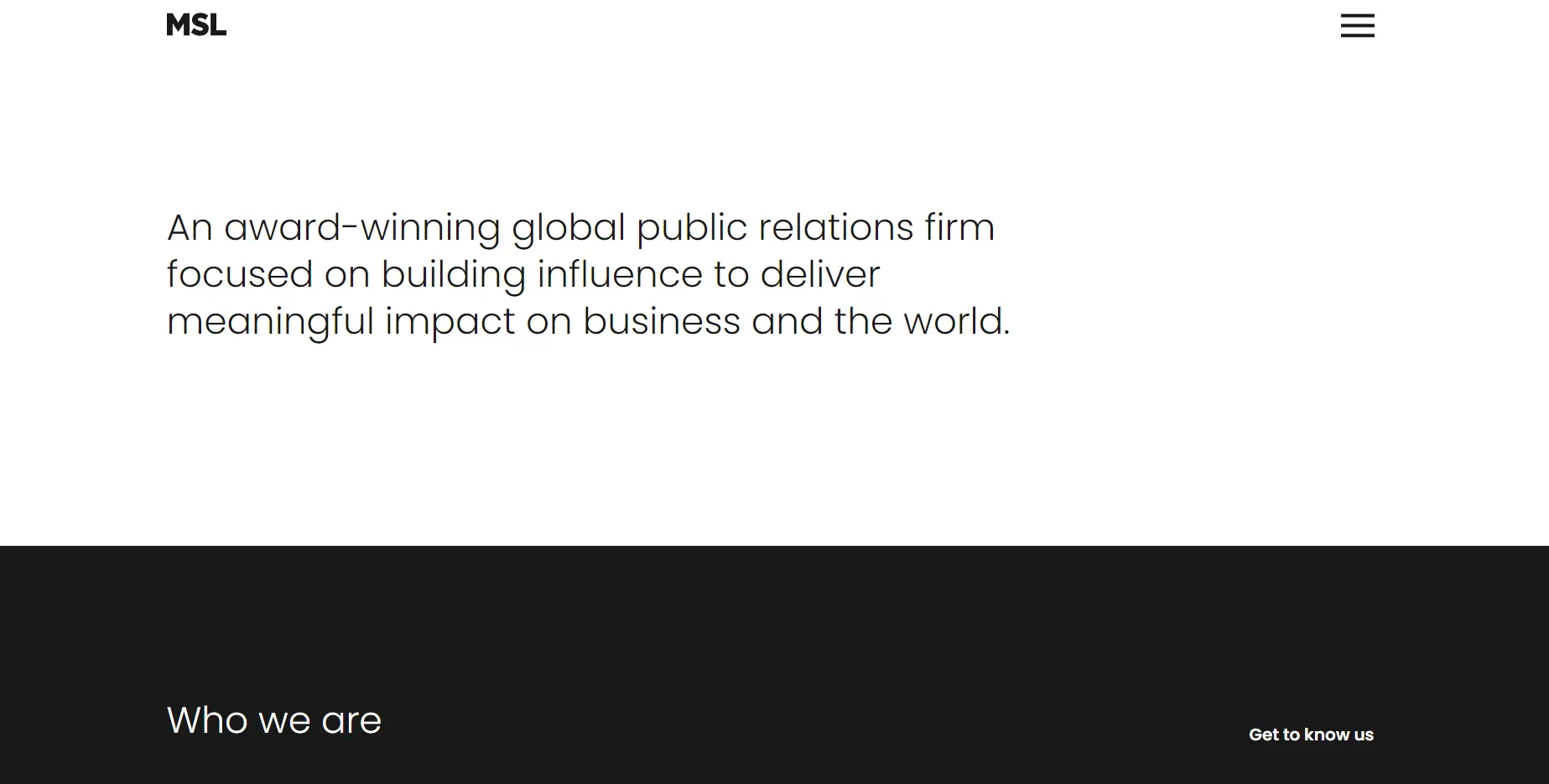
Headquartered in France, The MSL group is an award-winning and one of the leading PR agencies in the world which needs no introduction.
What makes MSL different though, is the fact that instead of having one CEO globally, they have multiple CEOs, one for every country they serve. And given the number of countries (40) they operate from, it’s quite a unique approach to have that many CEOs.
Yet, what works for them, works for their clients too.
And which shows if you consider that they are 7th largest PR firm in the world. Thanks to their strong hold of the market, effective strategies, unique storytelling, and creative ideas.
10. Hill+Knowlton Strategies:

Standing at number 10, is the world’s 10th largest PR company- Hill+Knowlton Strategies which was founded way back in 1927 by none other than the pioneer of public relations in America, John W. Hill.
Based in New York, and serving over 40 countries with double the offices, H+K puts special focus on purpose and performance. Their trademark approach, better known as 3P Communications, revolves around purpose + performance = preference.
What this means is that if you have a clear purpose, it’s easy to come-up with performance strategies that are most likely to work.
And on that note, let’s end this post by concluding that to get the most out of hiring a PR firm, you should have a prior understanding of your goals and PR objectives.



